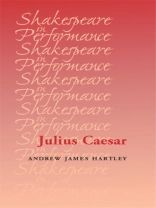Julius Caesar presents a performance history of a controversial play, moving from its 1599 opening all the way into the new millennium with particular emphasis on its twentieth- and twenty-first-century incarnations on stage and screen. The book tracks the play’s evolution from being a play about the oratorical skill of noble Romans to its recent manifestations as a dark political thriller.
Chapters in this theoretically savvy and global study consider productions such as Orson Welles’s groundbreaking examination of European Fascism, Joseph Mankeiwicz’s Oscar winning 1953 film, politically complex productions at the Royal Shakespeare Company, and shows from around the world which interrogate their own cultural and educational context as well as pressing contemporary concerns such as the reach of mass media.
The result blows the dust off a play sometimes considered old-fashioned, navigates its thorny theatrical qualities and revels in those productions which have so excited audiences.
Tabla de materias
Introduction: political theatre
1. “So are they all, all honourable men”: Julius Caesar before the Second World War
2. The rise of European Fascism: Welles at the Mercury Theater
3. (Un) American identities: Mankiewicz (1953)
4. Wise saws and modern(ist) instances: Anderson, Barton and Nunn
5. Glories past: the minor films
6. The Romans in Britain. Caesar under Thatcher
7. Accents yet unknown: Global Caesars
8. ‘Growing on the South’: Georgia Shakespeare 2001 and 2009
9. A strange disposed time: Caesar at the Millenium
Appendix: major cast and company staff of select twentieth century productions
Bibliography
Index
Sobre el autor
Andrew James Hartley is Robinson Distinguished Professor of Shakespeare Studies at the University of North Carolina at Charlotte












